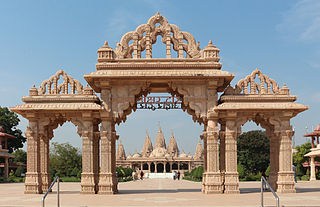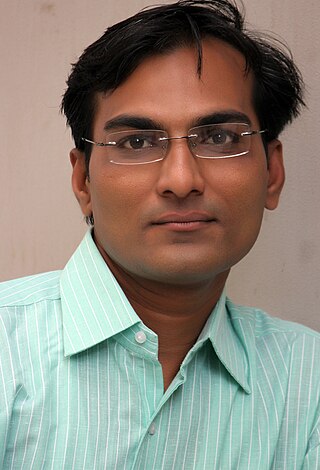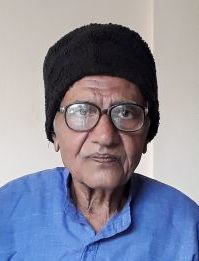
Ustad Alla Rakha Qureshi, mononymously known as Alla Rakha, was an Indian tabla player who specialised in Hindustani classical music. He was a frequent accompanist of sitar player Pandit Ravi Shankar and was largely responsible for introducing tabla to the Western audience.

Kathiawar is a peninsula, near the far north of India's west coast, of about 61,000 km2 (23,500 sq mi) bordering the Arabian Sea. It is bounded by the Gulf of Kutch in the northwest and by the Gulf of Khambhat in the east. In the northeast, it is connected to the rest of Gujarat and borders on the low, fertile hinterland of Ahmedabad. It is crossed by two belts of hill country and is drained radially by nine rivers which have little natural flow aside from in monsoon months, thus dams have been built on some of these. Kathiawar ports have been flourishing centres of trade and commerce since at least the 16th century.

Bhavnagar is a city and the headquarters of Bhavnagar district in the Indian state of Gujarat. It was founded in 1723 by Bhavsinhji Gohil. It was the capital of Bhavnagar State, which was a princely state before it was merged into the Indian Union in February 1948.
Habib Wali Mohammad (Urdu: حبِیب ولی محمد), was a Pakistani ghazal and film playback singer.

Sursinhji Takhtasinhji Gohil, popularly known by his pen name, Kalapi was a Gujarati poet and the Thakor (prince) of Lathi state in Gujarat. He is mostly known for his poems depicting his own pathos.

Wali Muhammad Wali (1667–1707), also known as Wali Dakhani, Wali Gujarati, and Wali Aurangabadi, was a classical Urdu poet from India.

Rajendra Anantrai Shukla is a Gujarati poet. He taught at various places before voluntarily retiring. He published several poetry collections which won him several major Gujarati literary awards.
Manubhai Pancholi also known by his pen name Darshak, was a Gujarati language novelist, author, educationist and politician from Gujarat, India. He participated in the Indian independence movement and held several offices after independence.

Barkat Ali Ghulam Hussain Virani, known by his pen name Befām, was Gujarati author and poet especially known for his ghazals.

Dhruv Bhatt is a Gujarati language novelist and poet from Gujarat, India.

Anil Chavda is a Gujarati language poet, writer and columnist from Gujarat, India.

Bhavesh Bhatt is a Gujarati language ghazal poet from Gujarat, India. His works include Chhe To Chhe (2009) and Bhitarno Shankhanaad (2014). He won the Shayda Award of 2014 for his contribution in Gujarati ghazal poetry.

Ashok Chavda, also known by his pen name Bedil, is a Gujarati poet, writer and critic from Gujarat, India. His anthology of poetry, Dalkhi Thi Saav Chhutan (2012), was awarded the Yuva Puraskar by the Sahitya Akademi in 2013. His collection of known writings include Pagla Talaavma (2003), Pagarav Talaavma (2012), Tu Kahu Ke Tame (2012), Pityo Ashko (2012), Shabdoday (2012), and Ghazalistan (2012), which is a translation of Urdu ghazals written by Indian and Pakistani poets. He is also a recipient of the Yuva Gaurav Award (2012) from the Gujarat Sahitya Akademi, and the Dasi Jivan Award (2013–14) from the Government of Gujarat. He has appeared in several TV and radio programs on All India Radio and Doordarshan.
Hardwar Goswami is a Gujarati language poet, writer, and playwright from Gujarat, India. He wrote the poetry collection Hawa Ne Kinare (2005), and his poems have been published in several Gujarati magazines. He won the Yuva Gaurav Award in 2009 for his contributions to Gujarati poetry.

Vinod Joshi is an Indian poet, writer and literary critic in Gujarati language from Gujarat, India. His notable works include Parantu, a collection of Geet, Shikhandi, a long narrative poem based on Shikhandi, a character from the Mahābhārata, Radio Natak: Swarup ane Siddhant, Tundil-tundika, a form of padyavarta, a Gujarati medieval literary genre, and Zalar Vage Zoothadi, a collection of poems. He is the recipient of the Jayant Pathak Puraskar (1985), Critic's award (1986), Kavishwar Dalpatram Award (2013), Sahitya Gaurav Puraskar (2015), Narsinh Mehta Award (2018), Kalapi Award (2018), Darshak Sahitya Sanman Award (2021), Narmad Suvarna Chandrak (2022) and Sahitya Akademi Award (2023).

Harish Krishnaram Dave, better known by his pen name Harish Meenashru, is a Gujarati language poet and translator from Gujarat, India. He is best known as a postmodern poet in Gujarati literature. Some of his significant works include Dhribaangsundar Eni Pere Dolya (1988), Suno Bhai Sadho (1999), Tandul (1999), Parjanyasukta (1999), and Banaras Diary (2016). His poems have been translated in Hindi, Marathi, Malayalam, Kannada, German, and English. He received a Kalapi Award (2010), Vali Gujarati Gazal Award (2012), and Narsinh Mehta Award (2014). He received the 2020 Sahitya Akademi Award for his poetry collection Banaras Diary (2016).

Balashankar Ullasram Kantharia, was a Gujarati poet.

Harikrishna Pathak is a Gujarati poet, short story writer, editor and children's writer from Gujarat, India.
Musaji Isapji Hafesji, popularly known by his pen name Dipak Bardolikar, was a Gujarati poet, writer and journalist. Born and educated in Bardoli, he was involved in the Indian independence movement. He moved to Karachi in Pakistan after the partition of India. After returning to India in 1960s, he was deported by the Government of India to Pakistan. After working for a brief period in East Pakistan, he moved to Karachi. He worked with several Gujarati dailies published from Karachi including Gujarati edition of Dawn. He is widely recognised for his contribution to the diasporic Gujarati literature. He had published several works of poetry and history research. He also published his two-volume autobiography.

Atmanimajjan is an 1895 collection of poems in Gujarati by Indian writer Manilal Dwivedi. The poems in the collection are heavily influenced by Advaita (non-dual) philosophy, which was at the core of Manilal's philosophical thinking. Uniquely in Gujarati poetry, for each poem Manilal wrote a long commentary, interpreting it in terms of Advaita philosophy.

















